Responsible Corporate Citizenship
Impactful Interventions for
Enriching Lives
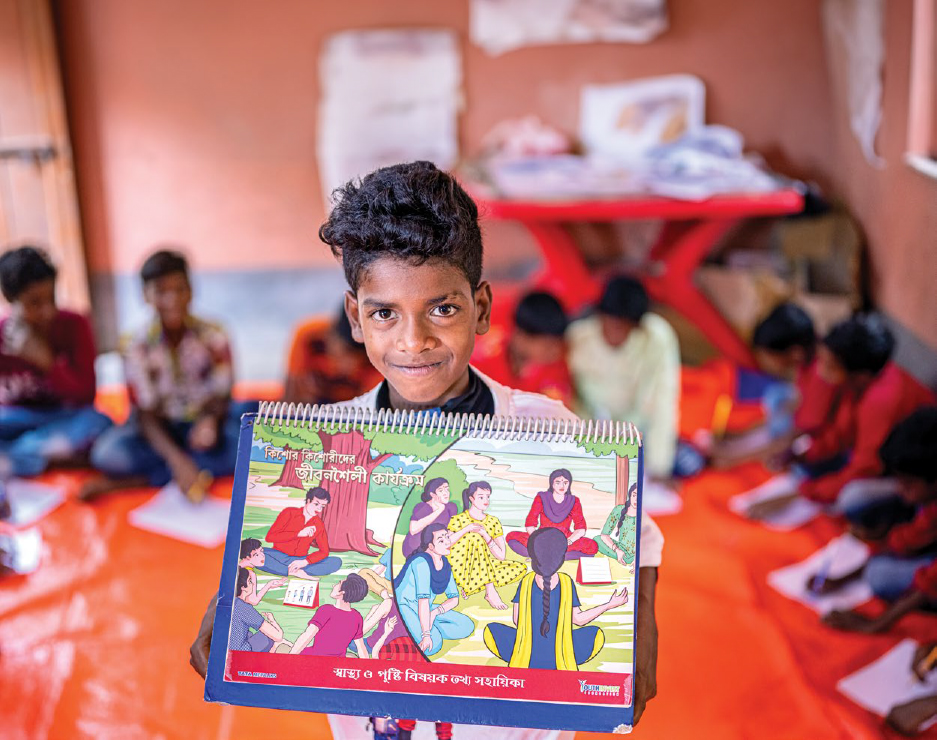
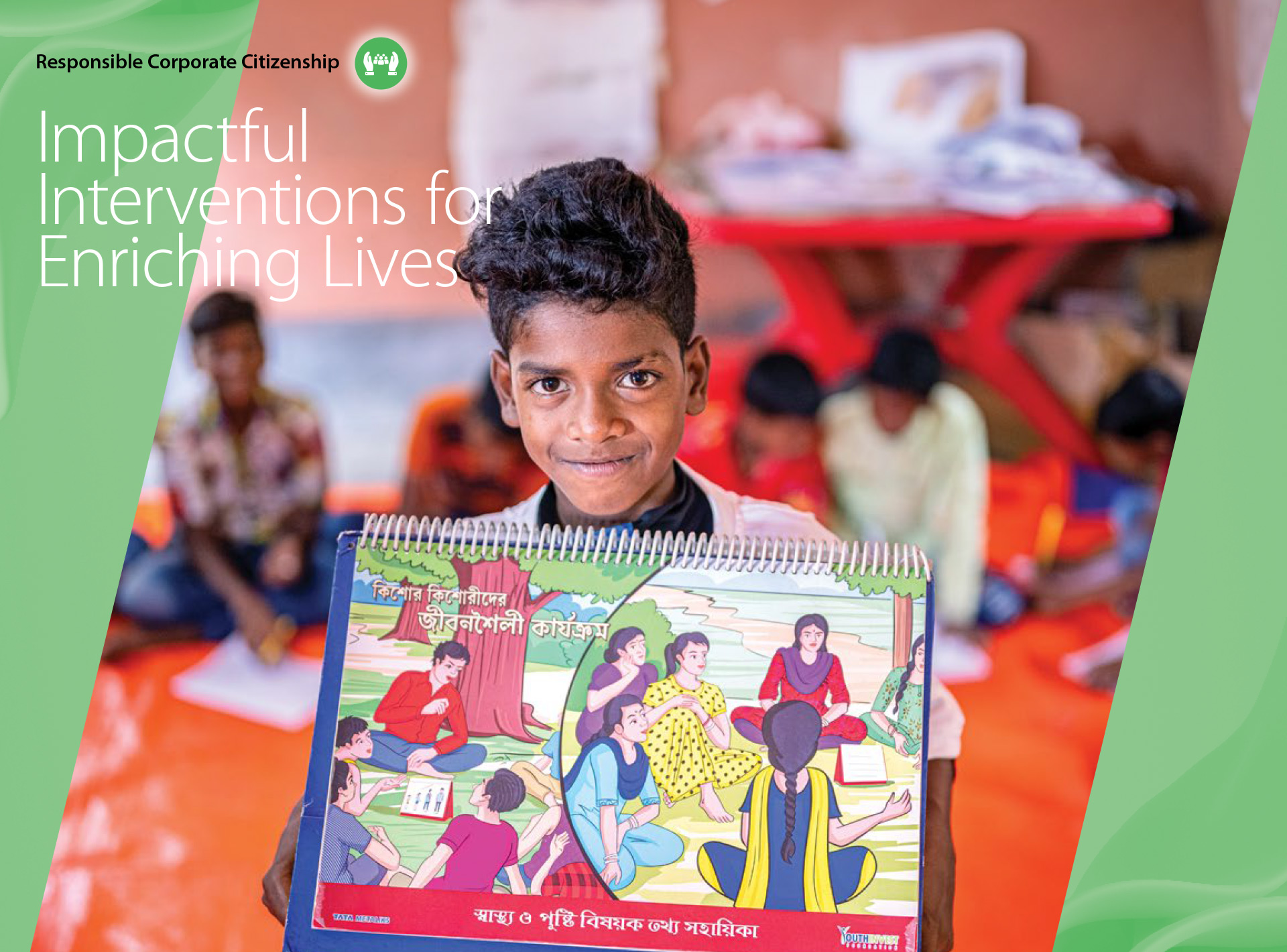
Priority Areas
- Environmental Sustainability:
- Reduce Carbon footprint
- Improve air quality
- Reduce specific water consumption
- Expanding community outreach through CSR activities
Material Topics
SDGs Impacted
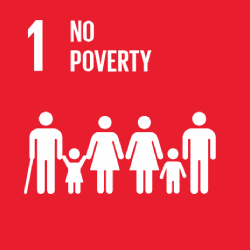
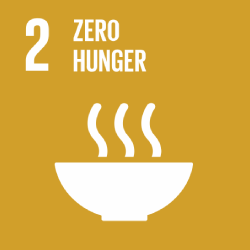
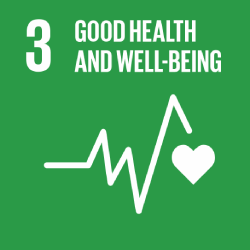
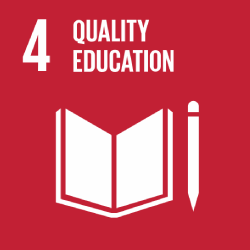
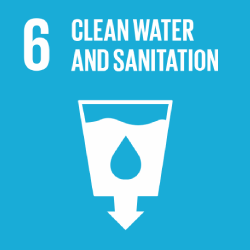
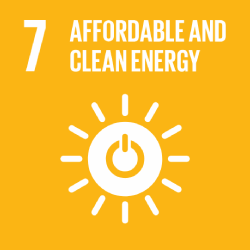
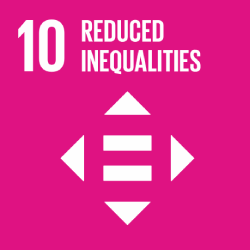
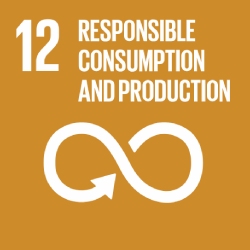
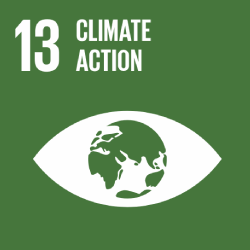
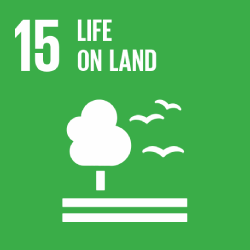
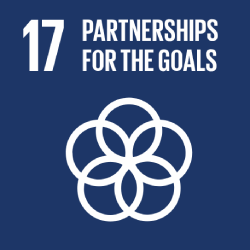
Capitals Impacted
Financial
Natural
Social and Relationship
We are focusing on reducing our carbon footprint through decarbonisation strategy, improving air quality and reducing our water footprint. We are committed to supporting communities in their journey for a better quality of life. We provide need-based interventions to empower communities across the areas of our operations. We are creating opportunities for sustainable livelihoods through our community initiatives.
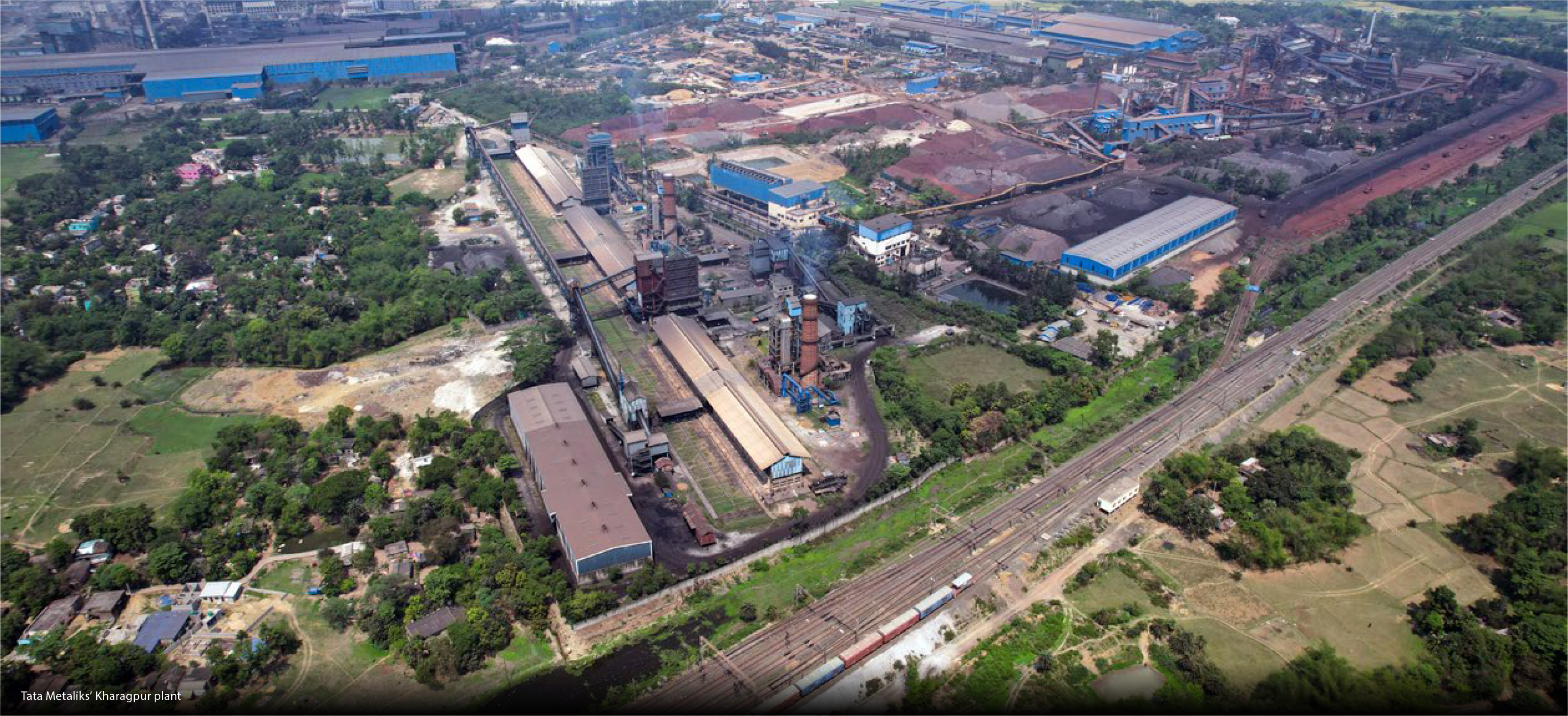
Tata Metaliks’ Kharagpur plant
Embedding best practices and going beyond
We have successfully implemented an efficient environmental Management system that incorporates global best practices. Our commitment to environmental Sustainability is demonstrated by our adoption of the CII-GBC GreenCo framework, developed by CII - Sohrabji Godrej Green Business Centre. This framework, known as the GreenCo Green Company Rating System, is the first of its kind in the world. In our first year of implementation, we are proud to have achieved a ‘Gold’ rating.
Since our inception, our main objectives have been to minimise resource consumption and adopt sustainable operating practices across our entire value chain. In line with our group policy, we have formulated a Sustainability policy specifically for our Company. To strengthen our commitment to environmental stewardship, we have a Board-level Safety, Health and Environment (SHE) Committee. Which plays a vital role in ensuring the integration of Sustainability throughout our operations. Our Sustainability initiatives, which fall under the domain of Natural Capital, are driven by an Integrated Improvement Programme framework as well as our specific CSR interventions.
Our climate performance is disclosed through Carbon Disclosure Project (CDP) and we are pleased to share that we have received a “B” score in CDP - Climate Change Disclosure and an “A-” score in CDP - Supplier Engagement Rating (SER). This reflects a significant improvement of four levels from our score last year.
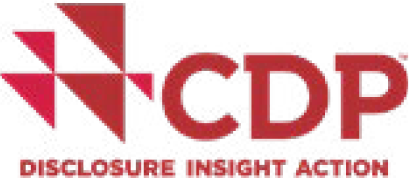
Climate Change Disclosure
Supplier Engagement Rating
Additionally, we have been honoured with the CII - CAP (Climate Action Program) 2.0 Oriented Category Award and have been recognised as the 2nd Runner-up in the General Category of the CII Energy Conservation Award (ENCON 2022). ; a testament to our dedication to energy conservation and efficiency.
Reducing our Footprint
In our pursuit of reducing our carbon footprint and optimising energy consumption, we have implemented a range of initiatives focused on electrical energy conservation and solid fuel saving. To ensure effective implementation, we have conducted a comprehensive Energy Audit which was carried out by a BEE-accredited agency.
Managing our Footprints
We have taken various initiatives to reduce carbon footprint and optimising energy consumption. Notable interventions are highlighted:
Electrical Energy
We have implemented various measures to save electrical energy, including:
- Optimised flaring gas to improve power generation.
- Controlled the speed of the sinter cooler fan to achieve power savings.
- Synchronised the operation of the Furnace Exhaust System (FES) with the opening and closing of the cast at the Mini Blast Furnace (MBF).
- Coordinated the Bag Filter operation with the vibrating screen operation at the Raw Material Handling System (RMHS).
- Installed Variable Voltage and Variable Frequency (VVF) drives at the Finishing Line Internal Grinding to reduce energy consumption.
- Implemented automation control in the RAV motors at DIP-1 to enhance energy efficiency.
- Replaced the conventional lighting in the main shed of the entire DIP-1 plant with LED lights.
- Installed Static Var Generator (SVG) and Harmonics Filter at the Low-Tension Power Control Centre (LTPCC) of DIP-1.
Solid Fuel
We implemented prediction modelling to enhance sinter productivity by reducing process variability. Additionally, optimised flux charging during the sintering process and minimised the amount of raw flux added in the blast furnace (MBF) through a flux optimisation model are essential steps.
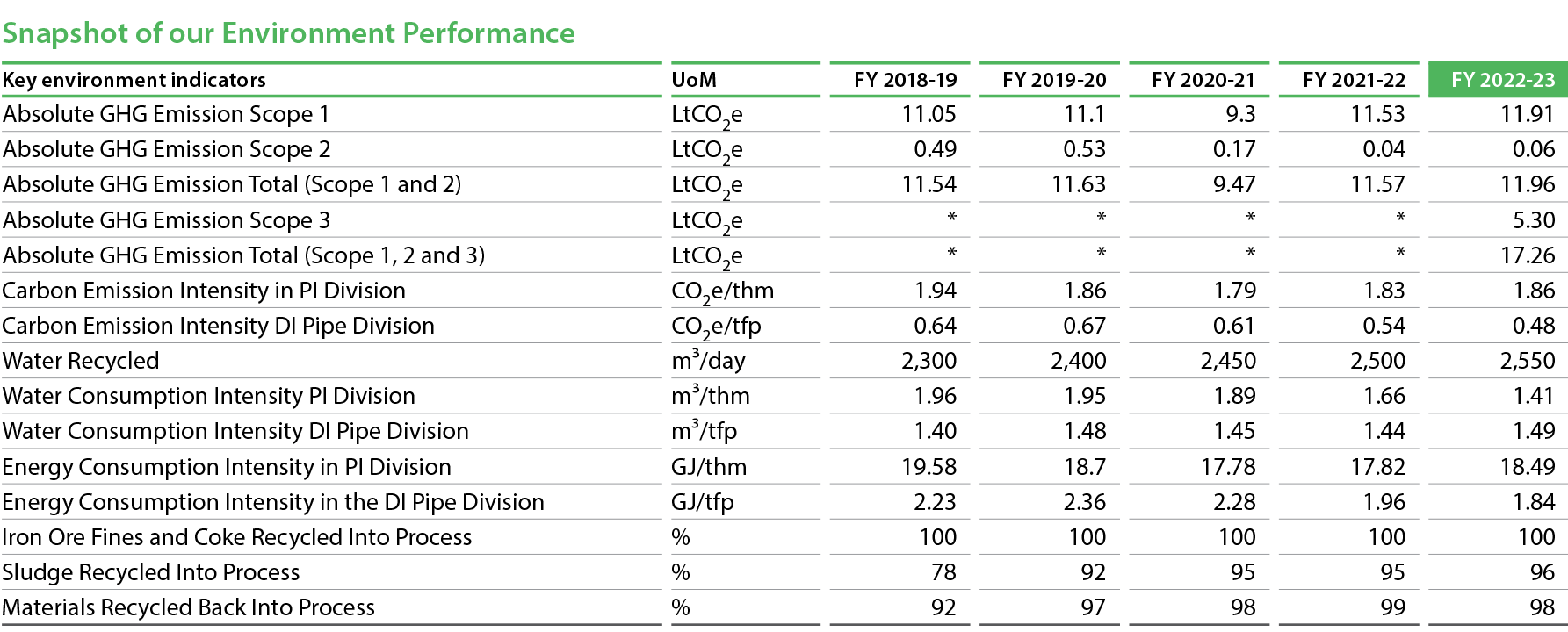
We measured Scope 3 emissions for FY 2022-23. Recently previous year figures are not measured and hence not comparable.
Towards Carbon Neutrality
In line with the Tata Group’s goal of attaining carbon neutrality by 2045, we also remain committed and therefore working on recalibrating our roadmap for decarbonisation for identifying the key levers to realise our carbon neutrality objectives.
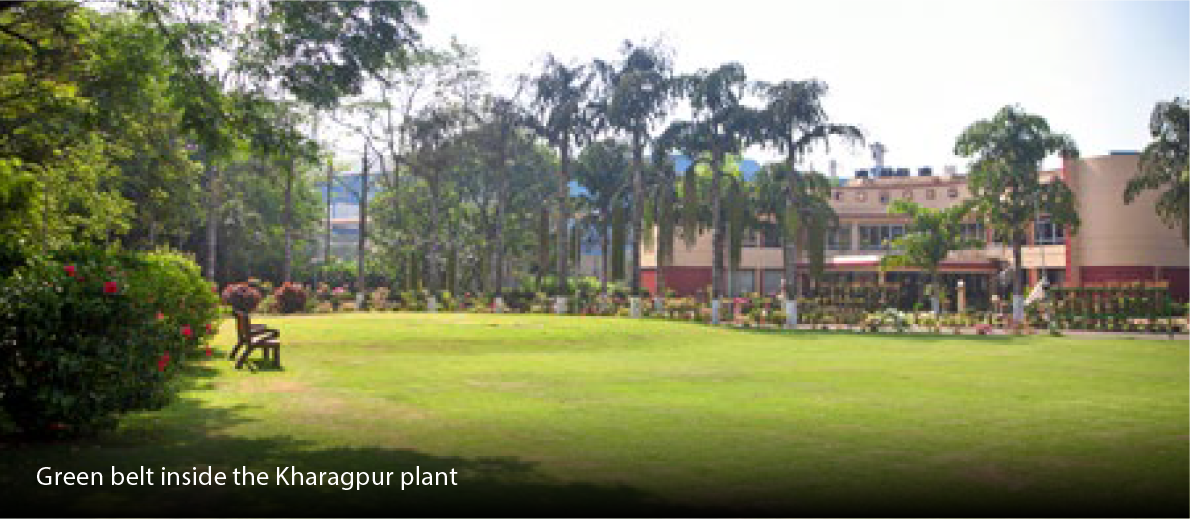
Improving Air Quality
We remain committed to continuously improving air quality within our plant and the neighbouring community. We regularly assess and recalibrate our actions to ensure that our efforts are aligned with the goal of improving air quality near our operations. Some impactful interventions are:
- Installed higher efficiency Electrostatic Precipitator (ESP) at Sinter Plant (Head ESP) to significantly reduce emissions.
- Retrofitted the cyclone separator in the DIP de-dusting system to further reduce stack emissions.
- Implemented fugitive emission reduction initiatives at DIP Plant, Sinter Plant and Iron Ore yard, including installation of wind shelter fencing.
Water and Waste Management
In line with our commitment to reducing freshwater consumption and minimising the impact of our operations on water resources, we have undertaken several interventions for water conservation and effective waste Management. Some impactful interventions are:
- Operational improvements and modifications at the DIP unit to maximise recycling efforts, thereby reducing the need for fresh makeup water.
- Optimised operation of the Effluent Treatment Plant (ETP) at DIP unit to enhance its efficiency and effectiveness in treating wastewater.
- Installed a 450 KLD capacity ETP to reduce fresh water intake.
- Developed rainwater storage and harvesting ponds within the plant premises and implemented similar interventions outside the facility’s fence.
- Initiated the process of reducing groundwater and have obtained approval for utilising river water through an infiltration gallery.
- Implemented initiatives to increase material circularity, such as utilising process waste in the agglomeration process and scrap utilisation in pipe manufacturing.
Jal Se Jeevan and Water Sustainability
In our pursuit of improving the water balance in our ecosystem, we are implementing a range of conservation measures which include process optimisation, modification and adoption of the best available technology in the area of water conservation, as well as construction of ponds and rainwater harvesting systems.
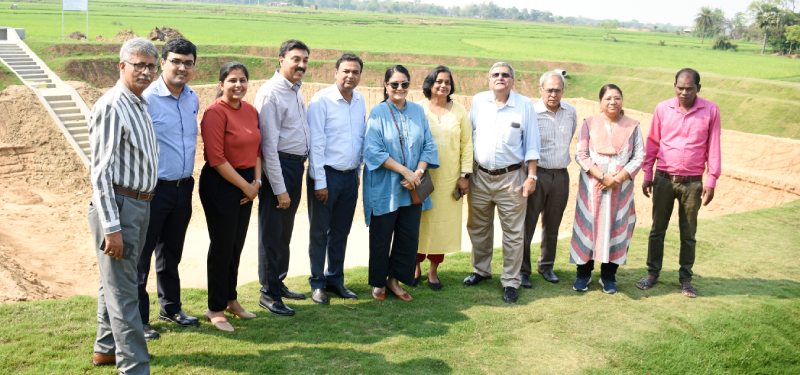
Independent Directors’ visit to see the progress of Jal Se Jeevan Project
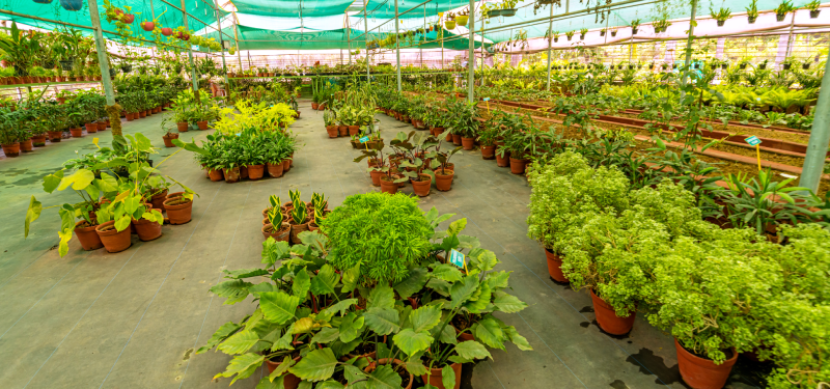
Green house park inside the Kharagpur Plant
Green Belt Development
To enhance our green belt, we have taken significant steps such as planting large number of saplings within our plant premises and distributing in the nearby villages. Additionally, we cultivate medicinal plants and operate a cutting-edge poly greenhouse with a hydroponic system, housing around 5,000 plant species.
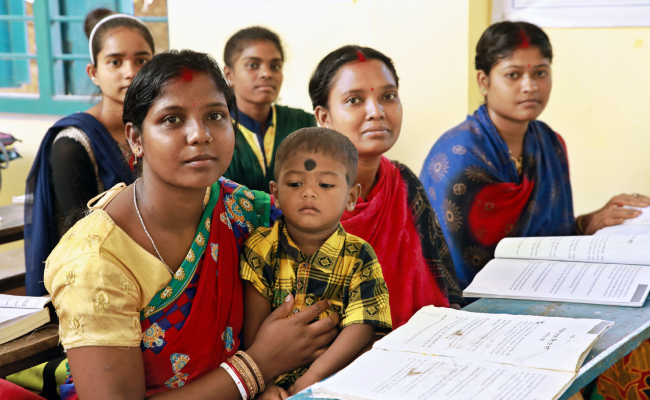
Corporate Social Responsibility
Our commitment to Society extends beyond obligations, as we strive to address community needs while considering environmental aspects and adding value through our organisational involvement. We focus on various aspects of societal well-being, including education, essential enablers, employability, entrepreneurship, empowerment and the environment. Through these initiatives, we aim to contribute to the overall betterment of society and create a positive impact in the communities we serve.
Contribution for CSR
Beneficiaries
Dalit and Tribal Beneficiaries
Affirmative Action Vendors
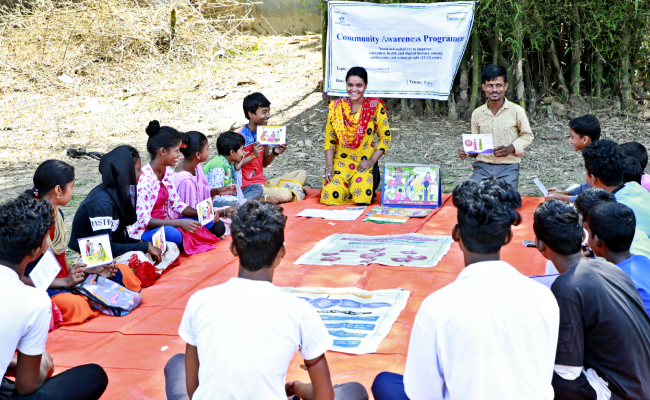
Empowering through Education
Recognising the profound impact of education as the ultimate catalyst for transformative change, we endeavour to foster the holistic development of children and youth by facilitating equitable access to high-quality education. Our comprehensive interventions encompass a wide spectrum of initiatives, ranging from enhancing infrastructure in Government schools to providing scholarships to outstanding students hailing from economically disadvantaged backgrounds, as well as the Scheduled Caste (SC) and Scheduled Tribe (ST) communities. Additionally, our efforts encompass learning enhancement programmes, education on adolescent health and nutrition, computer and English language proficiency and adult literacy initiatives.
Key Initiatives
- TML 300 Schools Project
- Scholarship for Meritorious Students
- Adolescent Health, Education and Digital Literacy Project
- Improving English and Computer Learning in High Schools
- Learning Enhancement Projects
- Adult Literacy
- U15 Football Training
Beneficiaries (Dalit and Tribal 21,500+)
SDG Linkage

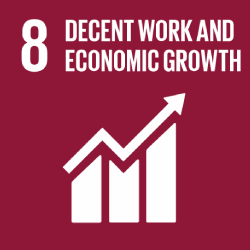

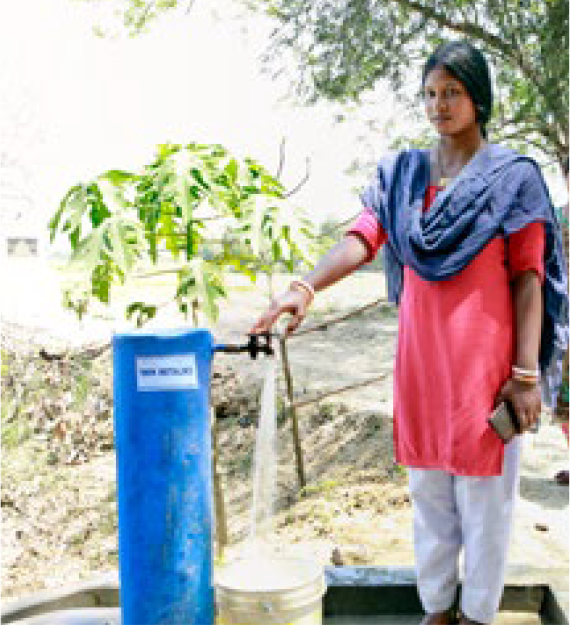
Facilitating Essential Enablers
Our focus is on creating social and physical infrastructure to promote the overall wellbeing of local communities. This involves establishment of essential infrastructure, including safe drinking water facilities, sanitation systems, improvement in village roads, healthcare access and disability certification services.
Key Initiatives
- Drinking Water and Sanitation Infrastructure
- Health Camps in Howrah Foundries and TML Truck Parking
- Ambulance Service in Kolkata
- Disability Certification
Beneficiaries
SDG Linkage



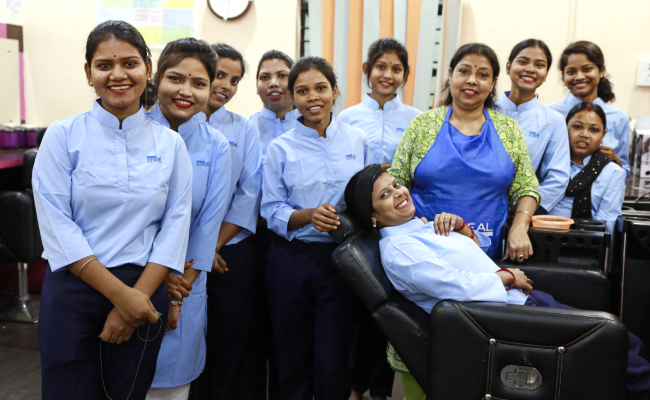
Enabling Employability
Our objective is to foster development of a skilled and employable workforce through short term and full term trainings on trades with higher job and entrepreneurial potential. The interventions are specifically targeted to support youth from socially and economical marginalised communities.
Beneficiaries (Dalit and Tribal 168)
Key Initiatives
- Tata Metaliks Skill Development Centre
- Diploma in Engineering
- BSc. Nursing
- General Nursing and Midwifery
SDG Linkage




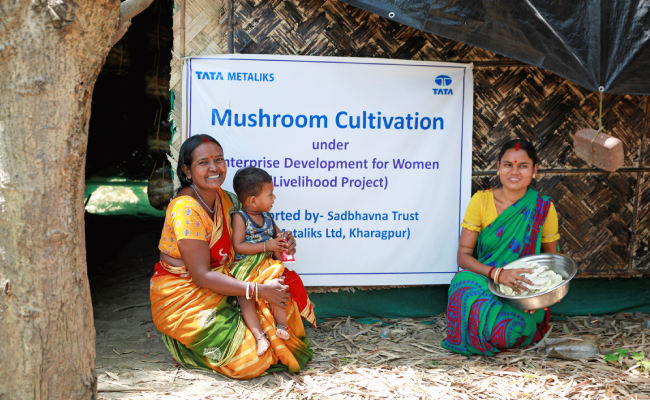
Driving Entrepreneurship
Our goal is to actively generate additional income opportunities for marginalised and small-scale farmers, with a particular emphasis on women. We achieve this by promoting farm and off-farm activities that enable them to diversify their income streams. We are also committed to development and support of entrepreneurs from Affirmative Action communities, ensuring their meaningful participation and economic empowerment within our value chain.
Beneficiaries (Dalit and Tribal 607)
Key Initiatives
- TML NABARD Tank-Based Livelihood Model Project
- Capacity Building of Farmers
- Capacity Building of AA Vendors and Self-Help Group Members
SDG Linkage




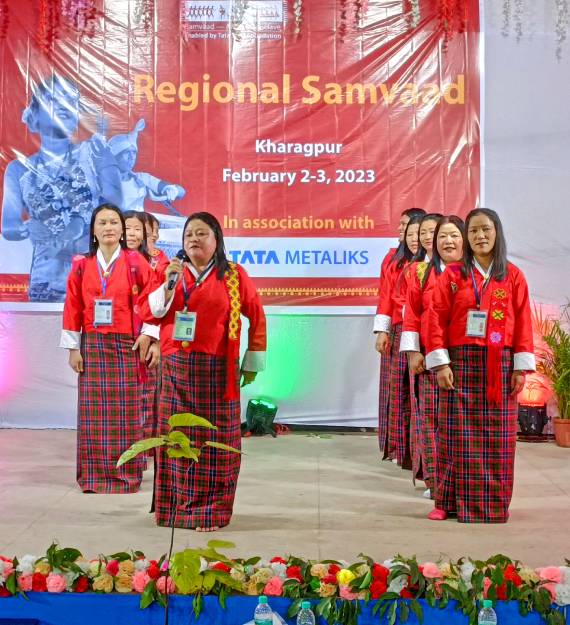
Advancing Empowerment
We are dedicated to fostering opportunities for cultural and institutional awakening within tribal and other marginalised communities.
Beneficiaries (Dalit and Tribal 376)
Key Initiatives
- Regional Samvaad – Conclave of the Tribes of West Bengal
- Effective Living and Leadership Programme
- Awareness Workshops and Seminars
SDG Linkage




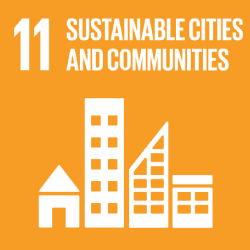

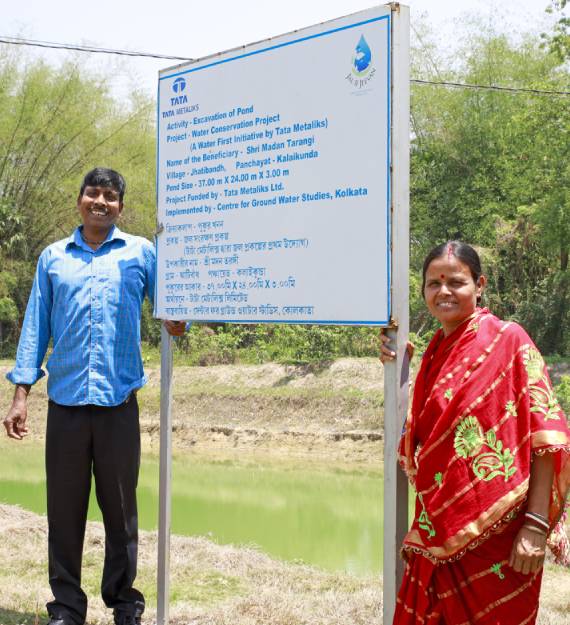
Caring for the Environment
We are committed to making significant contribution to environmental protection and conservation through various initiatives including expanding the green cover surrounding our manufacturing unit, promoting water conservation measures, exploring innovative methods such as processing aquatic weeds into craft and raising awareness among local communities about pressing environmental concerns.
Beneficiaries (Dalit and Tribal 1,200+)
Key Initiatives
- Plantation of Horticulture and Timber Saplings
- Excavation/Renovation of Ponds
- Water Hyacinth Base Handicraft Product Development
- Awareness of Environmental Issues
SDG Linkage



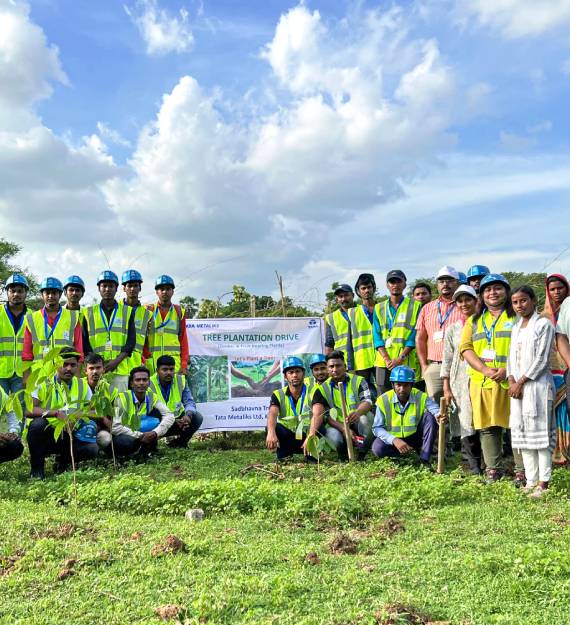
Bolstering Employee Volunteerism
Employee volunteerism plays a crucial role in strengthening the bonds between employees and the community, while also fostering a sense of purpose and fulfilment. Our employees actively contribute by actively participating in through various CSR activities, thereby creating a positive and meaningful impact in improving their lives.
Employee Volunteering Hours
Key Initiatives
- Cleaning Drives
- Plantation Drives
- Village rallies for awareness on social and environmental issues
- Visits to the homes for the abandoned
- Awareness sessions for community members
- Mentoring of students
SDG Linkage



Impact Stories
Empowering women entrepreneurs
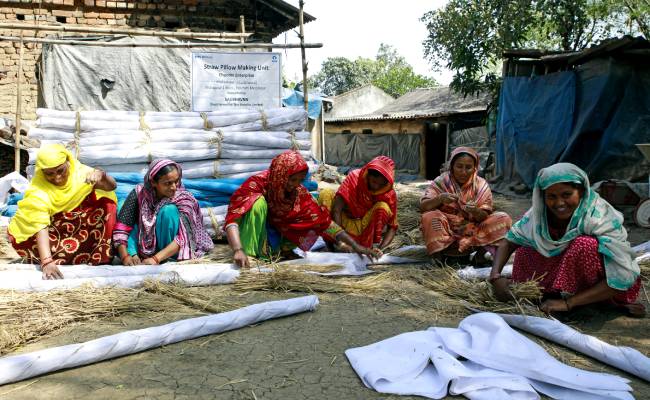
Chandni Enterprise is a promising business venture led by a group of minority women from a neighbouring village.
In 2018, an expert trainer from the minority community was deployed to train around 30 women in stitching, tailoring and Bandhani printing. After six months of dedicated training, these women began stitching various types of garments to lead a stable livelihood. When the COVID-19 pandemic struck, the group impressively stitched and supplied around
15,000 masks for our workforce.
Driven by the desire to expand the Affirmative Action (AA) vendor base, the Group was approached with a new opportunity - to supply straw pillows, a packaging material used for transporting DI Pipes. Eager to seize this opportunity, the group underwent training provided by the Procurement team. We further supported the Group by providing tissue cloth, a crucial raw material, reducing their working capital requirement and streamlining the procurement process. Currently, they fulfil 20-25% of the total straw pillow requirement each month.
Chandni Enterprise stands as a shining example of empowerment, resilience and the power of inclusive business partnerships.
Overcoming challenges and pursuing academic excellence

Ram Hembram, hailing from a humble tribal family with deep financial constraints. Seeking better educational opportunities and to ease the burden on Ram’s parents, his fate brought him to Ajabpur village at a young age, within the TML CSR operational area.
During his tenth grade, Ram joined the pre-matric remedial coaching programme offered under the CSR interventions. Despite limited time to prepare for his Board exams, he diligently attended coaching classes, sought guidance from teachers, and put in extensive effort. Ram fared well and cleared his matriculation exams and also received TML Sadbhavna Merit Scholarship for three consecutive years. His tenacity now serves as an inspiration for fellow students.
In the same year, Ram successfully navigated the selection process for Diploma Engineering Training at Tata Steel Technical Institute. TML contributed 65% of the total training cost as scholarship, enabling Ram to continue his pursuit of academic and personal growth.
A journey of education and resilience
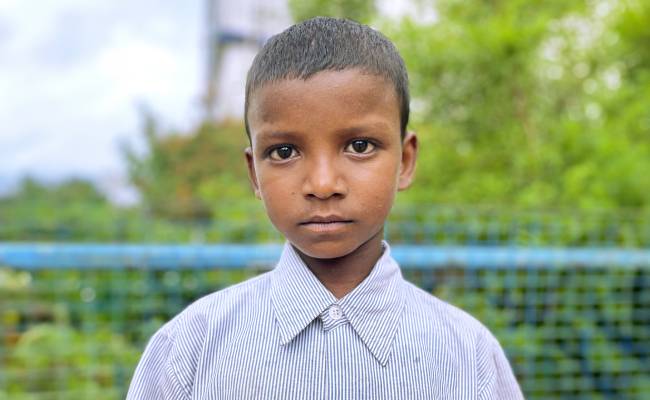
Deb Sabar, belonging to the tribal community, faced various hardships in his early childhood. He got distanced from his father due to unforeseen circumstances and lost his mother. This sudden tragedy resulted in a long hiatus from education. Deb lost interest and become involved in household and agricultural labour
The TML 300 Schools Project, identified Deb during the village survey. Recognising his potential, Deb was chosen as one of the candidates for the Residential Bridge Course Centre initiated under the Project.
Since joining, Deb has shown remarkable progress, and we are optimistic about his future. Our dedicated efforts aim to empower him with the education and skills to aspire for bright future ahead.

Way Forward
Through our wide range of social engagement initiatives, we are committed to supporting education, fostering employability through skill development, and promoting health by ensuring access to safe drinking water and sanitation infrastructure. We are actively expanding our endeavours in entrepreneurship and environmental initiatives to address pressing environmental concerns, while also empowering local women through income-generation activities. To ensure the effectiveness of our efforts, we conduct regular need and impact assessment surveys, allowing us to better understand the requirements of the communities we serve and align our CSR and Affirmative Action priorities accordingly. These proactive measures guarantee that our interventions are targeted and in line with the needs of the communities.